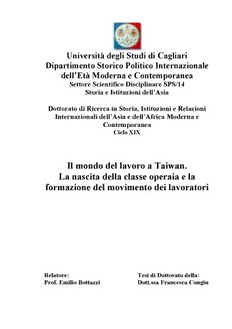
Il mondo del lavoro a Taiwan. La nascita della classe operaia e la formazione del movimento dei lavoratori PDF
226 Pages·2006·1.388 MB·Italian
Most books are stored in the elastic cloud where traffic is expensive. For this reason, we have a limit on daily download.
Preview Il mondo del lavoro a Taiwan. La nascita della classe operaia e la formazione del movimento dei lavoratori
Description:
he thesis has been an historical reading of Taiwan industralization and of the formation of its labour movement. The research question was based on the evidence that the labour movement has been weak. The intention of the research was to understand why, by focusing the attention on the fragmentation of labour produced by the Taiwanese export oriented mode of industrialization. Taiwan’s capitalist industrialization can be examined through an historical approach of state–society relations under the Gramsci model of historical analysis expressed on Notebook 25 “On the Margins of History, History of the Subaltern Groups”. Gramsci assumed that labour history is a disaggregated function of civil society’s history and of its relation with the state. To interpret the history of Taiwan labour through this kind of approach, it is necessary, according to the model, to understand the pre-capitalist mentality and social dynamics characterised by the so called guanxi (informal social networks), a typical aspects of Confucian societies. Industrialization installed on the top of this pre-existing social base that became the foundation of Taiwanese labour-state-capital relations. Guanxi in Taiwanese capitalist industrial society create such a strong hegemonic alliance between state and capital that constrained labour in a cage, preventing any autonomous initiative and reaction of workers. Thus, the movement was born as a tool of party politics and was directed by both the ruling party (KMT) and the opposition party (DPP). As a conclusion, labour movement in Taiwan rather than being a workers’ way of affirming their interests, it has been a strategy of capital to affirm its hegemony.
See more
The list of books you might like
Most books are stored in the elastic cloud where traffic is expensive. For this reason, we have a limit on daily download.
